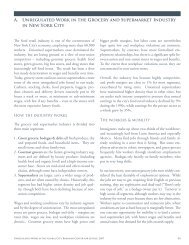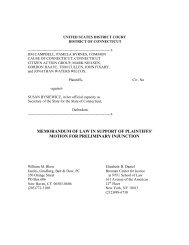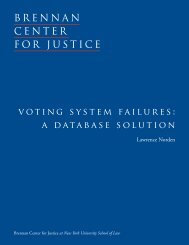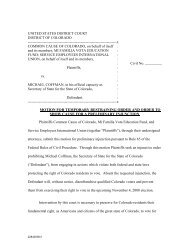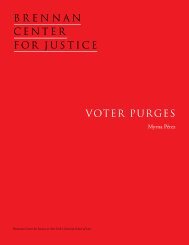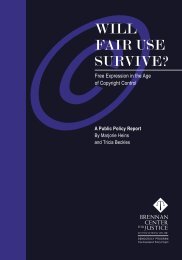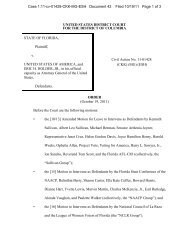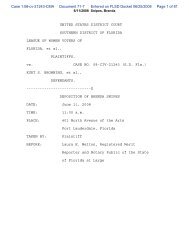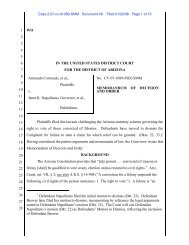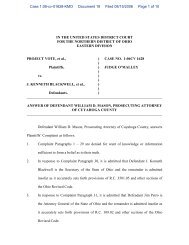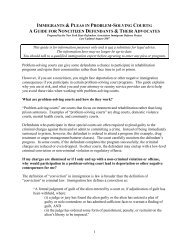Motion to Dismiss - Brennan Center for Justice
Motion to Dismiss - Brennan Center for Justice
Motion to Dismiss - Brennan Center for Justice
You also want an ePaper? Increase the reach of your titles
YUMPU automatically turns print PDFs into web optimized ePapers that Google loves.
12345678910111213141516171819202122232425262728MEMORANDUMPreliminary StatementPlaintiffs’ Complaint asks the Court <strong>to</strong> disregard longstanding federal and stateconstitutional law and grant felons the right <strong>to</strong> vote even if they have not completed theterms of their lawfully imposed sentences. The Plaintiffs’ claims are based on twonovel theories: (1) the State discriminates against them on the basis of wealth becausethe State does not res<strong>to</strong>re civil rights <strong>to</strong> felons until they have completed all the terms oftheir sentences, which may include the payment of fines; and (2) the State discriminatesagainst them because they “only” have committed crimes that were not felonies atcommon law.The constitutional sanction of felon disenfranchisement, however, has been wellestablished<strong>for</strong> more than a century. Unlike other rights set out in the Constitution, theright <strong>to</strong> vote is expressly limited as that right pertains <strong>to</strong> individuals who have chosen <strong>to</strong>engage in criminal conduct. Indeed, the Supreme Court established decades ago thatthe Constitution does not require states <strong>to</strong> res<strong>to</strong>re voting rights <strong>to</strong> felons at any time—even if they complete their sentence. Arizona chooses <strong>to</strong> res<strong>to</strong>re such <strong>for</strong>feited rights,but requires in return that a felon complete all the terms of his sentence.Under the reasoning of Supreme Court precedent, there is no equal protectionreview required with regard <strong>to</strong> Plaintiffs’ challenge. Moreover, even if equal protectionconcerns were implicated in the circumstances, Plaintiffs’ Complaint does not (andcannot) overcome the heavy presumption in favor of upholding Arizona’s constitutionaland statu<strong>to</strong>ry provisions on felon disenfranchisement.Neither do the many authorities that have addressed felon disenfranchisementlaws support Plaintiffs’ claim that the type of felony they committed governs whetherthe State may take away their voting rights. Instead, those authorities stand <strong>for</strong> thenotion that states constitutionally may remove the right <strong>to</strong> vote from individuals whoengage in any or all types of felonies. Accordingly, the Court should dismiss Plaintiffs’Complaint.Overview of Arizona’s Felon Disenfranchisement Laws and Relevant AllegationsCase 2:07-cv-01089-SMM Document 22 2 Filed 08/13/2007 Page 2 of 18


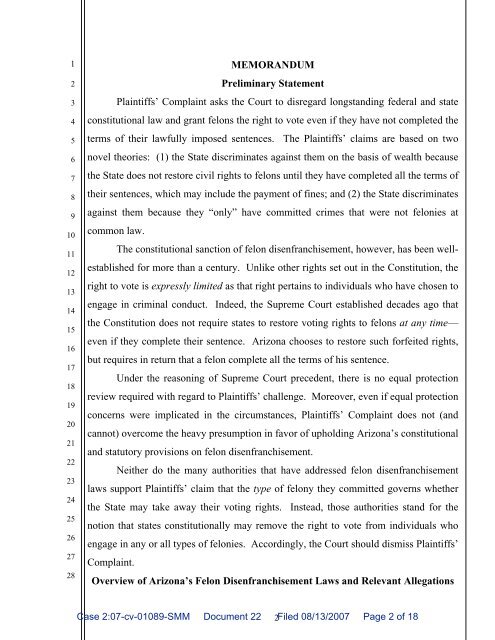
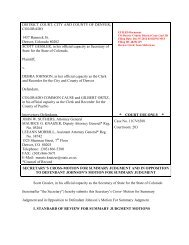
![Download the Letter [PDF] - Brennan Center for Justice](https://img.yumpu.com/50139248/1/190x245/download-the-letter-pdf-brennan-center-for-justice.jpg?quality=85)
